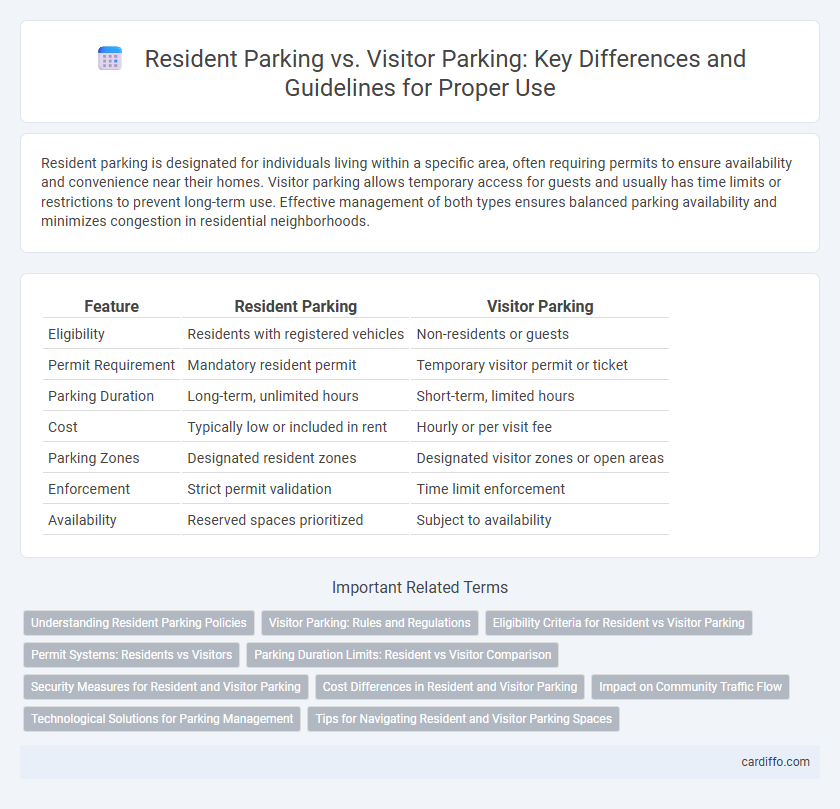Resident parking is designated for individuals living within a specific area, often requiring permits to ensure availability and convenience near their homes. Visitor parking allows temporary access for guests and usually has time limits or restrictions to prevent long-term use. Effective management of both types ensures balanced parking availability and minimizes congestion in residential neighborhoods.
Table of Comparison
| Feature | Resident Parking | Visitor Parking |
|---|---|---|
| Eligibility | Residents with registered vehicles | Non-residents or guests |
| Permit Requirement | Mandatory resident permit | Temporary visitor permit or ticket |
| Parking Duration | Long-term, unlimited hours | Short-term, limited hours |
| Cost | Typically low or included in rent | Hourly or per visit fee |
| Parking Zones | Designated resident zones | Designated visitor zones or open areas |
| Enforcement | Strict permit validation | Time limit enforcement |
| Availability | Reserved spaces prioritized | Subject to availability |
Understanding Resident Parking Policies
Resident parking policies prioritize allocated spaces for registered residents to ensure convenient access near their homes while minimizing unauthorized use. These policies often require permits, issued based on residency verification, and may include specific time restrictions or designated zones to manage demand effectively. Understanding the terms, eligibility, and enforcement mechanisms of resident parking enables compliance and helps avoid fines or towing.
Visitor Parking: Rules and Regulations
Visitor parking is typically designated for short-term use and often requires compliance with specific rules such as time limits, permit acquisition, and designated parking zones. Regulations may include maximum parking durations, restrictions on overnight parking, and mandatory display of visitor permits to avoid fines or towing. Property managers or local authorities enforce these rules to ensure availability and fair use of visitor parking spaces.
Eligibility Criteria for Resident vs Visitor Parking
Resident parking eligibility typically requires proof of residence, such as a utility bill or lease agreement, and vehicle registration showing the resident's address within the designated zone. Visitor parking eligibility often depends on the issuance of temporary permits by residents or local authorities, with restrictions on duration and frequency to ensure fair access. Both types of parking aim to balance convenience for residents with controlled access for non-residents, regulated through municipal codes and enforcement policies.
Permit Systems: Residents vs Visitors
Permit systems differentiate resident parking from visitor parking through tailored access controls and time restrictions. Resident permits typically provide unlimited or extended parking privileges within designated zones, ensuring convenient and long-term parking for inhabitants. Visitor permits are often time-limited or restricted to specific areas, managing short-term access and reducing congestion in residential neighborhoods.
Parking Duration Limits: Resident vs Visitor Comparison
Resident parking zones typically allow for extended or unlimited parking durations, ensuring long-term convenience for local inhabitants. In contrast, visitor parking areas impose stricter time limits, often ranging from 30 minutes to a few hours, to encourage turnover and availability for short-term guests. These duration restrictions play a crucial role in managing parking demand and maintaining accessibility within residential neighborhoods.
Security Measures for Resident and Visitor Parking
Resident parking areas often incorporate enhanced security measures such as gated access, personalized entry codes, and CCTV surveillance to ensure authorized use and protect vehicles from theft or vandalism. Visitor parking zones may implement time-limited permits, monitored entry points, and security patrols to balance accessibility with safety, minimizing risks associated with transient users. Effective security protocols for both resident and visitor parking contribute to overall community safety by deterring unauthorized access and providing controlled environments.
Cost Differences in Resident and Visitor Parking
Resident parking typically involves a fixed monthly or annual fee, often lower due to long-term commitments and subsidized rates provided by local authorities. Visitor parking usually incurs higher hourly or daily charges designed to regulate short-term access and maximize turnover. This cost disparity reflects the intended usage patterns, with residents benefiting from discounted, stable pricing and visitors facing premium rates for temporary convenience.
Impact on Community Traffic Flow
Resident parking zones prioritize long-term vehicle storage, reducing local street congestion by limiting through traffic and encouraging car ownership regulation, which stabilizes neighborhood traffic flow. Visitor parking areas introduce short-term parking options that can create intermittent traffic spikes but are essential for supporting local businesses and social visits. Balancing resident and visitor parking is crucial for optimizing traffic patterns and maintaining accessibility within urban communities.
Technological Solutions for Parking Management
Technological solutions for parking management enhance the differentiation between resident parking and visitor parking by using automated permit systems and license plate recognition technology. Smart sensors and mobile apps facilitate real-time monitoring of parking space availability while enforcing access control based on user status. This integration reduces unauthorized parking and improves overall efficiency in residential areas.
Tips for Navigating Resident and Visitor Parking Spaces
Maximize convenience by clearly understanding local parking regulations distinguishing resident and visitor parking zones, typically marked by specific signs or permits. Always display the correct permit or parking pass to avoid fines, and use designated visitor areas when hosting guests to prevent unauthorized parking conflicts. Utilize mobile apps or community resources for up-to-date parking availability and enforcement hours to streamline compliance and reduce parking-related stress.
Resident parking vs visitor parking Infographic

 cardiffo.com
cardiffo.com